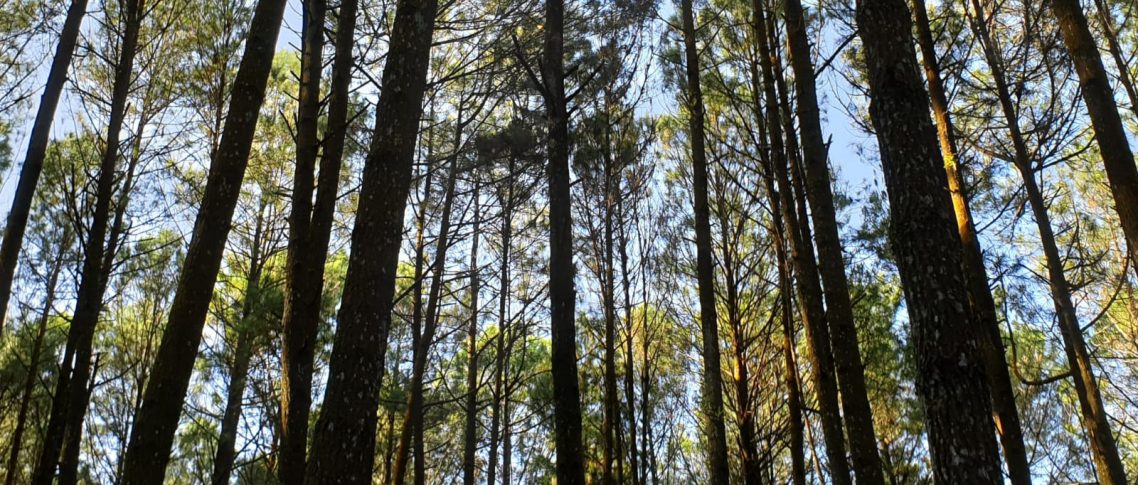You might not have heard of Mangunan Forest in Indonesia’s province of Yogyakarta, but chances are you’ve seen it. Selfies of cheerful tourists posing atop precarious treetop lookout posts, with a jaw-dropping backdrop of verdant forests, rolling hills, and glimmering water have been a regular fixture of many Instagram travel feeds over the past decade.
Designated a “special region,” Yogyakarta is the Javanese cultural heartland, amplifying its appeal for tourists.
But as a natural wonder, Mangunan’s popularity is no accident. Rather, it is due to concerted efforts since 2011 by a local community organization.
Led by Purwo Harsono (Ipung) and its partner Forest Management Unit (FMU) Yogyakarta, which is led by Aji Sukmono Nurjaman, their stunning surrounding forest protection area has been styled as an “Instagrammable” destination – and has helped their forests, and families, to flourish as well.
In 2016, the organization was created and named Cooperative Noto Wono, which led to the establishment of a formal partnership with the FMU to manage community-based ecotourism in Mangunan Forest.
Before the COVID-19 pandemic struck, the destination’s popularity grew, with millions of visitors stopping at the area every year.
The income of cooperative members almost doubled to $500 a person from harvesting the teak available in their tree-gardens.
The provincial government also enjoyed the benefits as well, deriving revenues based on a benefit-sharing agreement with the cooperative. These afforded 25 percent from total gross revenues, and the government received $140,000 (IDR 1.9 billion) in 2017, an amount that grew to $160,000 (IDR 2.3 billion) in 2018.
Until the pandemic, in anticipation of an increase of millions of visitors, the FMU and Noto Wono worked to mitigate the risks of environmental damage by ensuring tourism use was limited to a maximum of 10 percent of total forest area.
They also promoted the establishment of small-to-medium scale enterprises for value-added processing of forestry-based products and supported-businesses in tourism to ensure that profits stay in the community as much as possible.
Success and recognition
The partnership is now viewed regionally as a model for sustainable management through an integrated approach – so much so, in fact, that in 2021 Noto Wono’s chairperson, Ipung, won the “environmental pioneer” category for the prestigious national Kalpataru Award, which recognizes the achievements of individuals and groups that have contributed significantly to environmental conservation.
This recognition by the government of Indonesia was an acknowledgement of the 10-year journey, in addition to the range of awards the initiative had received since 2015.
“In the past, due to management restriction as protection forest, the people living around Mangunan mostly earned their incomes through non-timber forest products (NTFPs) by tapping pine sap, growing crops, and keeping bees; but the meager quantity of the pine sap that was available, found by locals made it difficult to make ends meet,” said Aji Sukmono. As the head of FMU, he has worked closely with the cooperative from the beginning.
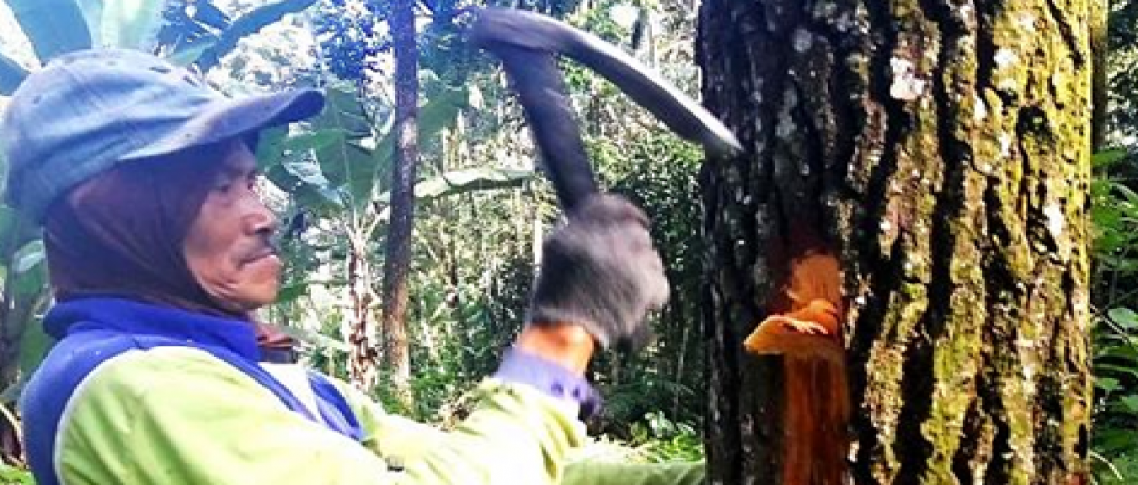
The growth in visitors to the area not only increased the focus on ecotourism, which alleviates pressure on NTFPs, but led FMU and community to boost agroforestry, honey, and cajuput oil (kayu putih) production initiatives in other forest management areas.
Community-based ecotourism became part of the overall adaptive strategy in the region, modifying earlier policies established by Indonesia’s Ministry of Environment and Forestry, which first designated Mangunan as a production forest, and subsequently as a protection forest, which restricted economic opportunities and potential for the local community.
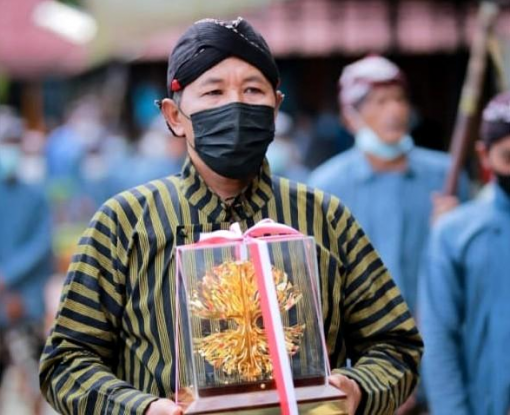
Purwo Harsono (lpung), head of the Noto Wono Cooperative, holds the Kalpataru Award. Handout/Noto Wono Cooperative
Now, under the ecotourism partnership, economic potential has opened up again for both local communities and the provincial government supports this initiative through set policy frameworks.
Further, “the shifting from NTFP extraction to more community-based ecotourism has been a sound adaptive strategy for meeting both economic objectives and livelihood needs for local communities,” said Ani Adiwinata, a scientist at the Center for International Forestry Research and World Agroforestry Centre (CIFOR-ICRAF), who is also the Coordinator for Landscape Governance Research for the Kanoppi Project, which seeks to increase forestry smallholder income by developing and promoting improved timber and NTFP production and marketing.
The Noto Wono Cooperative explicitly strengthened the position of local people within the endeavor as a formal institution representing their interests in ecotourism management.
“The 300-person strong cooperative’s vision is to care for, preserve and conserve forests for the development of ecotourism and environmental services, in order to achieve prosperity for its members and society in general,” Ipung said.
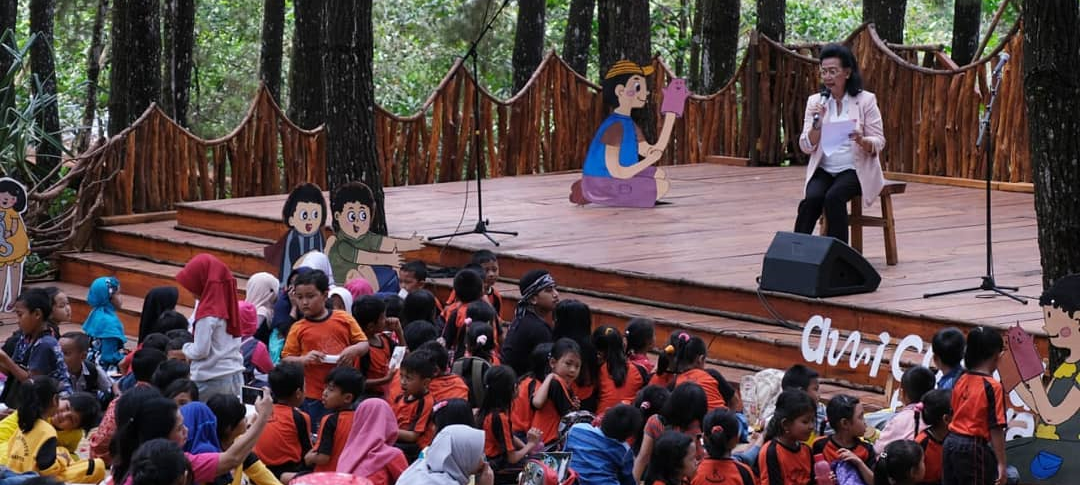
Joint effort
Under Kanoppi, CIFOR collaborated with teams from the Faculty of Forestry at Sebijak Institute of Gadjah Mada University led by Maryudi in documenting this long process as a successful case study model to inspire others to develop a resilient partnership-based inclusive business model that can cope with dynamic external changes such as national policy shifts.
“It seems that they have finally hit upon a successful, and sustainable, formula,” Maryudi said.
Yet, the cooperative is buffeted by change. Aspects of innovative adaptive strategy must be explored to address upheavals resulting from the pandemic. The latest National Law on Job Creation has affected change in FMU roles and responsibilities as the main partner of the local cooperative.
“The Environment and Forestry Agency of Yogyakarta strives to maintain forest ecosystems and the community is expected to earn a decent living and poverty rates can be reduced through thematic-based forest management,” said Kuncoro Cahyo Aji, head of Environmental and Forestry Agency of Yogyakarta, during a national virtual talk show organized by CIFOR-ICRAF and Sebijak Institute at the end of 2021 on the transformation of forest management policy in Indonesia.
Through a Thematic Forests Strategy, which prioritizes building resilience in the forest, while deriving economic benefit, for example, the government of Yogyakarta supports such initiatives as one built around the use of jack fruit. By supporting its production, the traditional culinary favorite gudeg, continues to be consumed in the province by locals and tourists, now built around sustainable initiatives and small-scale enterprises, which are largely home based. Development of various value chains offers employment for local communities.
With the set of thematic forests, we can focus more on development in accordance with predetermined themes according to each local condition and potential, community empowerment principles and Yogyakarta’s rich culture, in similar fashion to what we have initiated in Mangunan, he said.
“Under policy changes, the partners hope that the groundwork they have laid will help regional business owners, smallholders and the economy to respond dynamically to any turbulence or unexpected conditions”, Adiwinata said.
“As long as we have a strong base of resilient, inclusive business models, we hope that – whatever happens at the national level – these ventures will be able to continue to benefit the local and regional economy,” she added.
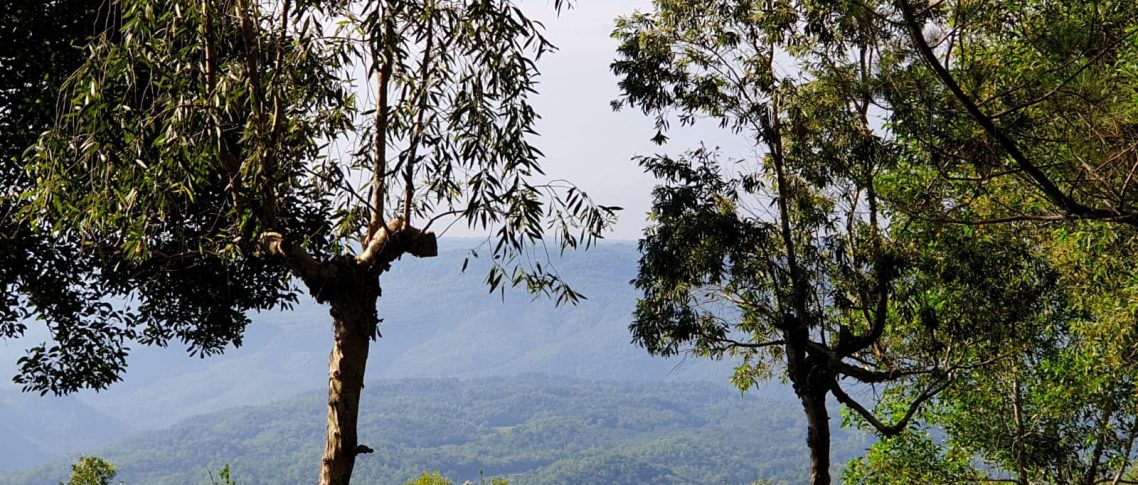
Activities for this project were implemented by CIFOR and Faculty of Forestry Gadjah Mada University for collaborative research entitled “Enhancing the effectiveness of governance forefront model in fostering Sustainable Forest Management: Case study of Kesatuan Pengelolaan Hutan (KPH) Yogyakarta” under Kanoppi Project. This project activities funded by the Australian Centre for International Agricultural Research (ACIAR), and coordinated by the Center for International Forestry Research (CIFOR) and the World Agroforestry (ICRAF) on developing and promoting market-based agroforestry options and integrated landscape management for smallholder forestry in Indonesia.
Story development : Monica Evans and Ani Adiwinata | Editing: Julie Mollins, Ani Adiwinata, Aji Sukmono B. Nurjaman and Fatwa N. Susanti | Web design: Gusdiyanto | Publication coordination: Leona Liu
Related publications:
We want you to share Forests News content, which is licensed under Creative Commons Attribution-NonCommercial-ShareAlike 4.0 International (CC BY-NC-SA 4.0). This means you are free to redistribute our material for non-commercial purposes. All we ask is that you give Forests News appropriate credit and link to the original Forests News content, indicate if changes were made, and distribute your contributions under the same Creative Commons license. You must notify Forests News if you repost, reprint or reuse our materials by contacting forestsnews@cifor-icraf.org.


